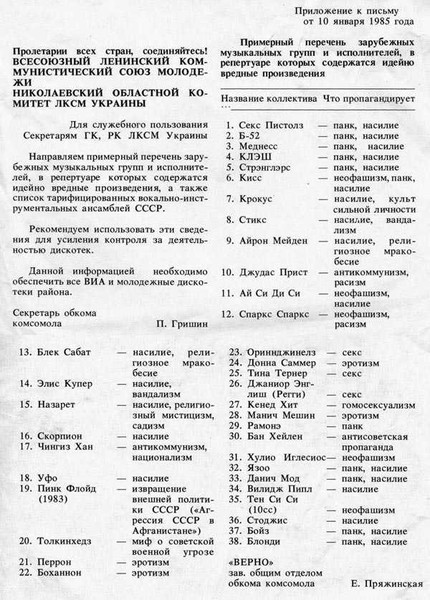38 ROCK BANDS BANNED IN THE USSR
 |
| Record company/label of USSR |
Representatives of government periodically compiled lists of forbidden bands and artists who “harmed” Soviet ideology and were “unacceptable” for values of Soviet people. As a result of this, songs of bands mentioned in those lists were not allowed to be played at youth discotheques to make sure people will live as the Soviet government wanted them to live and that they won’t try to seek for freedom. This document was released in 1985 as a banning order for committee of Komsomol (The Communist Union of Youth. More info about them here) of Nikolayev regional of Ukraine. What is more, this Cold War document below was kept in secret. It is funny how some bands and performers were called as “neofascist” or as “punk violence” acts with detailed reasons why they must be banned.
I’ve translated this document in English, so did many people around the net.
Here is a part of document which is interesting and eye-catching:
“The following is an approximate list of foreign music groups and artists whose repertoires contain ideologically harmful compositions.
This information is recommended for the purpose of intensifying control over the activities in discotheques.
This information must be also provided to all vocal-instrument ensembles [that’s bands] and youth discotheques in the region”
“Group Name and Type of Propaganda”
1. Sex Pistols - punk, violence
2. B-52s - punk, violence
3. Madness - punk, violence
4. Clash - punk, violence
5. Stranglers - punk, violence
6. Kiss - neofascism, punk, violence
7. Krokus - violence, cult of strong personality
8. Styx - violence, vandalism
9. Iron Maiden - violence, religious obscurantism
10. Judas Priest - anticommunism, racism
11. AC/DC - neofascism, violence
12. Sparks - neofascism, racism
13. Black Sabbath - violence, religious obscurantism
14. Alice Cooper - violence, vandalism
15. Nazareth - violence, religious mysticism
16. Scorpions - violence
17. Genghis Khan - anticommunism, nationalism
18. UFO - violence
19. Pink Floyd - distortion of Soviet foreign policy ("Soviet aggression in Afghanistan")
20. Talking Heads - myth of the Soviet military threat
21. Perron - eroticism
22. Bohannon - eroticism
23. Originals - sex
24. Donna Summer - eroticism
25. Tina Turner - sex
26. Junior English - sex
27. Canned Heat - homosexuality
28. Munich Machine - eroticism
29. Ramones - punk
30. Van Halen - anti-Soviet propaganda
31. Julio Iglesias - neofascism
32. Yazoo - punk, violence
33. Depeche Mode - punk, violence
34. Village People - violence
35. 10cc - neofascism
36. Stooges - violence
37. Boys - punk, violence
38. Blondie - punk, violence
It’s funny how Depeche Mode, the band which I loved listening as a child, was called as ”punk violence” band… And imagine Julio Iglesias as a neofascist…
And recently I remembered the fact i heard a long time ago. Back then, the band from USA called The Beach Boys wanted to have a concert together with Alla Pugacheva (singer who was very popular in the Soviet Union). The concert was announced, tickets were sold immediately. Strangely, the concert was cancelled when people were standing near arena and waiting for the concert. Of course after this announcement, they got really disappointed as most of them came from very far places. What is more, the militia (Soviet police) thought that this might become a protest against the Soviet system, so came up and started expel peacefully minded people with water flushes. It was a hot summer day, so the girls were accused for showing too much body (because the flush of water slopped their shirts). Everything ended up with less than a half of people punished for various reasons.
Why? Because the Beach Boys were Americans and Soviet government hated America...
P.S. See you in the next posts ;P










